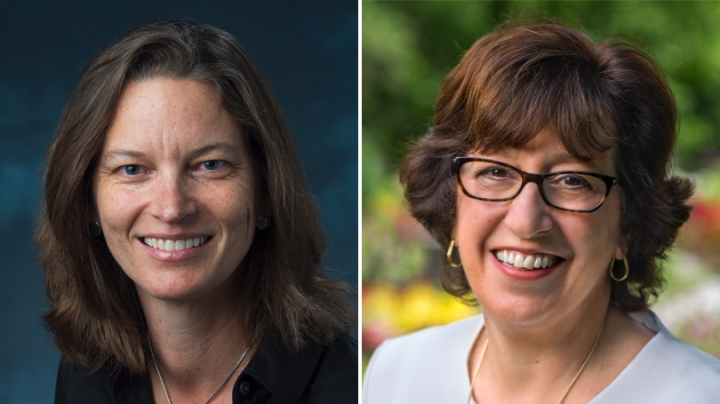The College’s science departments are welcoming back to campus six notable alumni who have each had a significant impact on their field of study to speak to the community.
Organized to commemorate the College’s 250th anniversary, “Celebration of Sciences” began during the winter term with its first guest, Mark Kasevich ’85, a professor of physics and of applied physics at Stanford University. Two more lectures are scheduled for this month, with three lectures slated for the fall to round out the series.
“It was very inspiring and encouraging knowing that a person who went to Dartmouth has become so successful in physics,” says Shadi Ali Ahmad ’22, who attended Kasevich’s Feb. 28 lecture. “He is utilizing a highly theoretical discipline in physics, quantum mechanics, to improve different parts of our lives.”
In April, the next two guest lecturers, Alexis Templeton ’93, Guarini ’95, and Martha Pollack ’79, will discuss their work in their respective fields of geomicrobiologist and artificial intelligence. Templeton is an associate professor of geological sciences at University of Colorado Boulder and the principal investigator of the NASA Astrobiology Institute’s Rock Powered Life team. Pollack is the president of Cornell University.
Templeton will speak on how life functions deep within rocks on Earth and perhaps other rocky bodies in our solar system from 3 p.m. to 4 p.m. on Friday, April 12, in Steele 006.
The gemomicrobiologist credits the Stretch, the earth sciences department’s annual off-campus field program, for attracting her to the earth sciences major.
“After my first experience, in 1991, I was so excited to pursue independent research that I did an honors thesis at one of the Stretch sites just outside of Yellowstone National Park in Cooke City, Mont.,” says Templeton. “As this work progressed, I traveled out with the next group of students each year to help lead exercises in this field area.”
Pollack, a computer scientist with research expertise in artificial intelligence, will present her lecture from 3:30 p.m. to 5 p.m. on Wednesday, April 24, in Filene Auditorium in Moore Hall. The lecture, “AI: The Good, the Bad, and the Ugly,” will examine the multidimensionality of advances in AI.
The foundation of Pollack’s later research in AI got its start at Dartmouth, where she cut her own path, supported by her adviser, Professor Hoyt Alverson, who encouraged her to take advantage of interdisciplinary opportunities at the College.
“The creation and completion of my own major developed in me an abiding instinct to be flexible, to ‘color outside the lines,’ when necessary, to seek out mentors, and then, later, to try to be a good mentor to others,” she says.
Guest alumni Paul Matsudaira, PhD ’81, Fiona Harrison ’84, and K. Barry Sharpless ’63 will round out the series during the during the fall 2019 term.
Matsudaira will be visiting campus Oct. 17 and 18. He a distinguished professor in the Department of Biological Sciences at the National University of Singapore, where he is also the principal investigator of the Mechanobiology Institute.
The National Academy of Sciences appointed Harrison, a professor of physics and astronomy at the California Institute of Technology, co-chair of the Astronomy and Astrophysics Decadal Survey in 2018. A date has not yet been confirmed for her lecture.
The winner of the 2001 Nobel Prize in Chemistry, Sharpless will share his latest research on Oct. 15. The Scripps Research Institute California chemist received the award for his work on chirally catalyzed oxidation reactions.
Thomas Spencer, professor emeritus of chemistry, who taught Sharpless organic chemistry in the fall of 1960 and invited him to join his research group along with other undergraduates, says Sharpless will leave his audience “amused and enlightened.”
Spencer says the research opportunities available to undergraduates at Dartmouth remains strong today. “There is plenty of opportunity for research,” he says, “and that research involves grad students and post-doc students. It’s a university-level opportunity.”
Katie Hamlin can be reached at katie.hamlin@dartmouth.edu.

